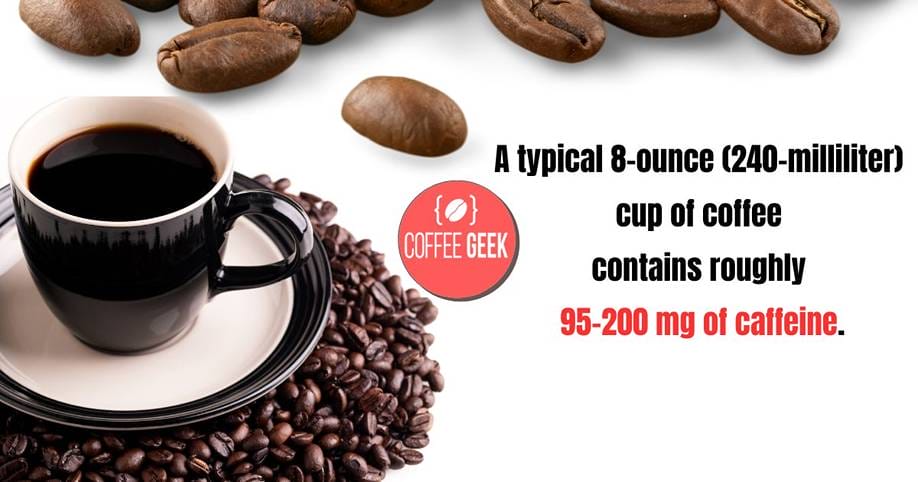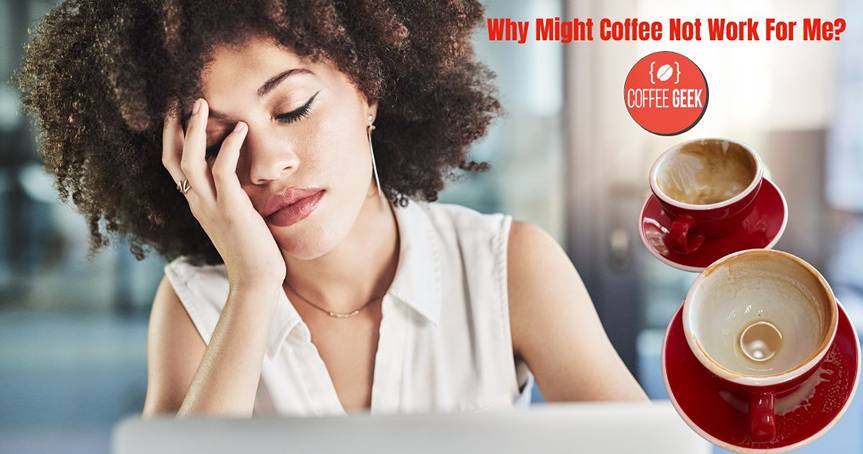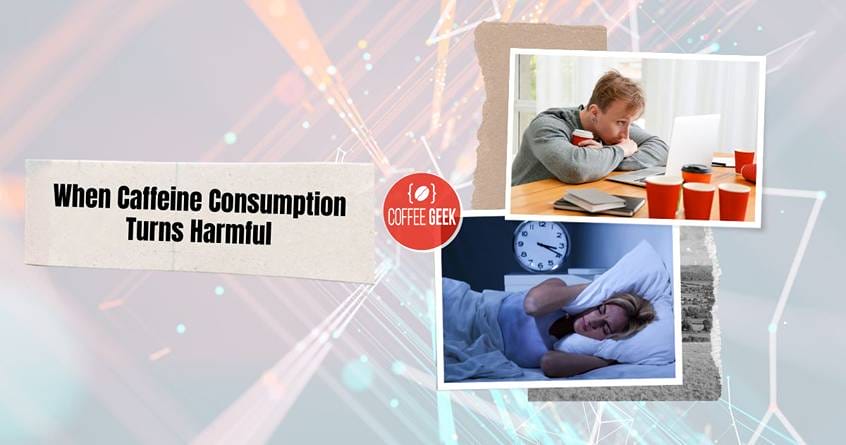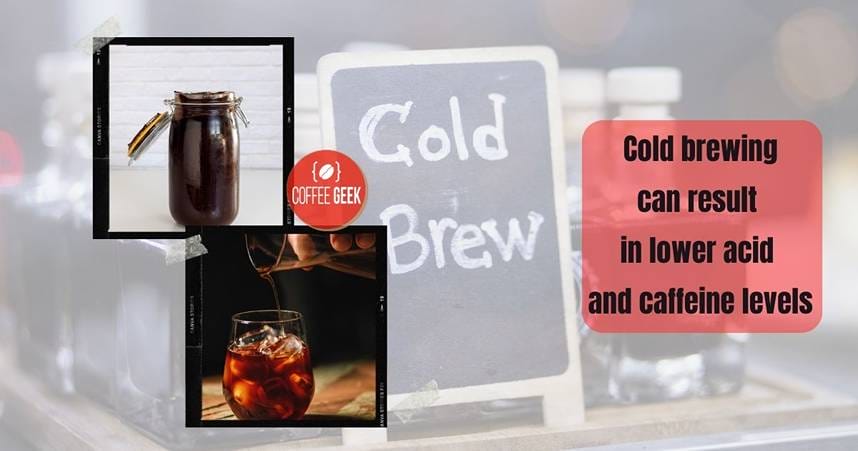For some, nothing is more revitalizing than the aroma and taste of a freshly brewed cup of coffee in the morning.
The caffeine in your coffee acts as a stimulant, providing a boost of energy to kickstart your day.
But what if your much-anticipated cup of coffee doesn’t serve this awakening purpose? Sometimes coffee doesn’t wake me up.
Here are the top 4 reasons why coffee does not give you the stimulating effect you desire and the truth about caffeine content in your beverage.
How Much Caffeine Does a Regular Cup of Coffee Have?
Unveiling What Your Cup of Coffee Contains
The amount of caffeine found in coffee is not standardized. It can differ based on factors such as the coffee brand, type of coffee beans used, and brewing method.

A typical 8-ounce (240-milliliter) cup of coffee contains roughly 95-200 mg of caffeine. However, this can vary dramatically depending on the kind of coffee and the way it is prepared.
How Brewing Method Affects Caffeine Levels
From French Press to Espresso, the brewing method used can increase or decrease the caffeine levels in your drink.
For example, finely ground coffee brewed in an espresso machine will have a higher concentration of caffeine compared to a cup of coffee made with a regular drip coffee maker.
Therefore, consider your brewing method when figuring out why your new coffee might not be waking you up as expected.
Comparing Coffee to Other Sources of Caffeine: Energy Drinks

Energy drinks are another popular source of caffeine that can be deceiving. Despite their reputation for giving you the energy you need, they contain significantly less caffeine than a cup of coffee.
So if you have recently switched from coffee to energy drinks and are wondering why the new source of caffeine doesn’t compare in terms of waking you up, this could be the reason.
How Does Caffeine Work in Boosting Energy Levels?
Why Caffeine May Give You an Energy Boost
Caffeine works by blocking adenosine, a neurotransmitter that makes you feel tired.
This leads to an increase in other neurotransmitters such as dopamine and norepinephrine, enhancing the firing of neurons and thus leading to a perceived energy boost.
However, this effect can vary from one coffee drinker to another.

The Role of Adenosine in Energy
Adenosine is a chemical found in your brain that promotes sleep and relaxation by slowing down nerve cell activity.
When you drink coffee, the caffeine inhibits the adenosine action, preventing you from feeling exhausted.
But if you drink coffee before bed and your goal is to stay awake, the interference with adenosine can lead to a restless night.
How Coffee Makes You Feel More Awake
Coffee can also cause the release of adrenaline and cortisol, which contribute to its stimulating effects.
However, this can be transient, and you may start to crave more coffee to sustain this boost of energy.
It is essential to understand this, especially if you’ve been increasing your cups of coffee per day and still feeling less awake.
Coffee Doesn’t Wake Me Up – Why Might Coffee Not Work For Me?

Understanding Your Caffeine Tolerance
If you’re a regular coffee drinker, you may have developed a caffeine tolerance.
This means you might require more coffee than a new coffee drinker to achieve the same effects of caffeine. Also, genetic factors can influence how caffeine affects you.
This is why some people can drink multiple cups of coffee without feeling too wired, while others may feel jittery after just one cup.
The Truth About Decaf Coffee
If you’re into decaf coffee thinking you’re freeing yourself from caffeine entirely, you might be wrong.
Decaf does not mean caffeine-free. A decaf cup still contains around 2-7 mg of caffeine.
So, if you’re sensitive to caffeine, even this small amount can affect your sleep quality.
How Much Coffee Should You Drink Per Day?

Caffeine intake should be moderated. For most healthy adults, up to 400 milligrams per day (about four cups of brewed coffee) seems to be safe and within the daily upper limit defined by many health organizations.
Is Coffee Healthy? Assessing the Effects of Caffeine
How Much Caffeine Intake is Considered Healthy?
A moderate quantity of coffee can be a healthy part of your diet.
According to the US Food and Drug Administration (FDA), a typical adult can safely consume up to 400 mg of caffeine daily — roughly the amount in four 8-ounce cups of coffee.
When Caffeine Consumption Turns Harmful

Excessive caffeine consumption can lead to side effects, including restlessness, insomnia, irregular heartbeats, and upset stomach.
So, limit your intake if drinking coffee every day is keeping you up at night, causing anxiety, or if you’re experiencing withdrawal symptoms without it.
The Potential Health Benefits of Regular Coffee
Light roast coffee can potentially provide health benefits such as protecting against certain diseases like Parkinson’s and Alzheimer’s, improving cognitive function, and boosting physical performance.
Besides, the rich antioxidants found in coffee can reduce inflammation and boost overall health.
How Does Coffee Affect Me Personally and What Can I Do About It?
Choosing the Type of Coffee for Your Needs
Switching your coffee can make a difference. If you’re sensitive to caffeine, a light roast coffee will be better because it contains less caffeine than darker roasts.
Also, considering the quality of the coffee and choosing organic and fair-trade options can make your coffee experience healthier and more enjoyable.
How Brewing Method Can Make Coffee More Effective
Changing your brewing method can also affect how you feel after drinking coffee.
Using methods such as cold brewing can result in lower acid and caffeine levels, which might be easier on your stomach and can make you feel less jittery.

How to Find Out Why Coffee May Not Wake You Up
To uncover why coffee might not be waking you up, analyze your coffee-related habits.
Consider factors like your caffeine tolerance, the type and amount of coffee you’re consuming, the method of preparation, your overall health, and lifestyle.
Experiment with different kinds of coffee, brewing methods, and consumption times until you find the routine that helps you derive the most benefits from your beloved beverage.
Whether you’re new to coffee or a seasoned aficionado, understanding the science behind caffeine and its effects on your body is vital.
Coffee can be a healthful, enjoyable part of your daily routine, as long as you pay attention to how you consume and respond to it.
| Reasons | Solutions ☕✨ |
|---|---|
| Tolerance to caffeine | Gradual reduction and caffeine breaks |
| Poor sleep quality | Improve sleep hygiene practices |
| Dehydration | Stay hydrated with water throughout the day |
| Lack of physical activity | Incorporate regular exercise into your routine |
| Chronic stress | Practice stress management techniques |
| Inconsistent sleep schedule | Establish a consistent sleep routine |
| Underlying health conditions | Consult a medical professional for evaluation |
Conclusion
For many people, coffee is the go-to solution to feel awake and alert, largely because caffeine is a stimulant.
However, there are instances where coffee won’t have this desired effect, leading some to wonder why coffee doesn’t wake them up as expected.
Understanding the role of caffeine in coffee and how it affects the body is key to unraveling this mystery.
Firstly, it’s important to recognize that caffeine in coffee varies. On average coffee cup contains about 95 milligrams of caffeine per serving.
For some individuals, this amount is sufficient to make them feel more alert.
However, others might require a higher dose due to developing a tolerance, while a small amount of caffeine may be enough for those with higher sensitivity.
One reason coffee can make them feel differently is due to how caffeine stays in your system.
The effects of caffeine can last several hours, and for those who consume coffee regularly, their body may become accustomed to the stimulant, diminishing its wakefulness effects.
Additionally, it’s noteworthy that while caffeine is safe for most people in moderate amounts, it can cause anxiety in some people, affecting their response to coffee.
It’s also found that the most popular times for coffee consumption are in the morning or early afternoon.
If one consumes coffee later in the day, the caffeine may not have the same impact, particularly if the body’s natural circadian rhythms are gearing down for sleep.
In conclusion, while coffee and its caffeine content are often effective at making people feel more awake, there are various factors at play.
These include the body’s tolerance to caffeine, the timing of consumption, and individual sensitivity.
Understanding these factors can help explain why, in some instances, coffee won’t necessarily provide the wakefulness that is expected from this popular beverage.
For those who find coffee no longer effective, it may be beneficial to assess their overall consumption of caffeine and consider other factors such as sleep quality and dietary habits.
FAQ
Why doesn’t coffee wake me up? What could be the reasons: top 4?
There could be several reasons why coffee isn’t working for you. You may have built a tolerance to caffeine, which minimizes its effects.
It’s also possible that you’re dehydrated — caffeine is a diuretic and can lead to more fluid loss, which can make people feel drowsy.
Another reason could be the way your body metabolizes caffeine — some people are fast or slow metabolizers, altering the effect of the caffeine.
Or, you may just not drink enough coffee. Generally, 4 to 5 cups of coffee are required for the full stimulating effects of caffeine.
Then how can I make coffee work for me to get that boost of energy?
There are a few methods you can try to prepare coffee work for you. Firstly, it’s important to ensure that you drink plenty of water alongside your coffee to prevent dehydration.
You could also try to reduce your tolerance to caffeine by limiting your coffee intake. Another way could be playing with the kind of coffee you usually drink.
For example, darker roasts generally have less caffeine because the roasting process reduces the beans’ caffeine content. So, opting for a lighter roast might help.
Lastly, while not specifically about coffee, ensuring you get good-quality sleep can make a big difference to your energy levels.
What can I find the right kind of coffee for me?
It’s a process of trial and error to find the right kind of coffee that can give you the boost you’re looking for. You should experiment with different roasts and brew methods.
Additionally, keep an eye on how much caffeine per serving is in your coffee. Also, consider investing in quality coffee and coffee gear to maximize the taste and overall effect for you.
What’s the truth about caffeine and energy?
The truth about caffeine is that it’s a stimulant. It works by blocking the receptors in your brain for adenosine, a neurotransmitter that makes you feel tired.
When these receptors are blocked, the levels of other neurotransmitters like norepinephrine and dopamine increase, leading to an increase in the firing of neurons.
This is what gives you a jolt of energy. However, caffeine’s effects can vary significantly between people and can often be affected by factors like size, weight, and tolerance.
Drinking a pot of coffee a day, is caffeine safe?
Coffee and caffeine, in general, are considered safe in moderation.
However, drinking a pot of coffee per day can lead to excessive caffeine intake depending on the size of your pot and the type of coffee you’re brewing.
Too much caffeine may lead to insomnia, nervousness, heart palpitations, and potential digestive issues.
Also, people can develop a dependence on caffeine and may experience withdrawal symptoms if they suddenly stop. Always manage your caffeine carefully.
Why doesn’t coffee wake me up even after I drink enough?
You might be experiencing caffeine tolerance. Tolerance to caffeine develops when regular use of caffeine decreases its ability to stimulate and wake you up.
Your body adjusts to the amount you regularly drink and it doesn’t have the same effect anymore.
However, cutting back on caffeine for a while can help reset your body’s response to it.
Does decaffeinated coffee give an energy boost?
Coffee decaffeinated contains very little caffeine, and as such, it is unlikely to provide the same energy boost as regular coffee.
That said, if you enjoy the ritual of drinking a hot beverage and find it comforting or relaxing, decaf can act as a placebo and might make you feel more alert.
How the way coffee is prepared can impact on its effect?
The way coffee is prepared can greatly affect its caffeine content.
For instance, espresso-based drinks generally contain more caffeine per ounce than regular brewed coffee, although due to serving size, a full cup of brewed coffee typically contains more caffeine overall.
Also, longer brewing methods can extract more caffeine.
What should I do if coffee isn’t waking me up?
If coffee isn’t waking you up, try drinking water to ensure you’re not dehydrated.
Also, consider getting sufficient and quality sleep, as relying mostly on coffee to wake you up isn’t a healthy habit.
Try to reduce your caffeine intake for a while to decrease your tolerance.
If all else fails, don’t hesitate to consult your doctor or a nutritionist. They might be able to provide guidance based on your particular needs.
How can I reduce the impact of caffeine and still enjoy my coffee?
Instead of relying solely on coffee for an energy boost, ensure you have a balanced lifestyle.
Regular exercise, enough sleep and a healthy diet all contribute to your energy levels.
Try to drink water with your coffee and eat something as well, to ensure that the impact of the caffeine is lessened.
If the caffeine from coffee is too much for you, consider switching to decaffeinated coffee, or different types of tea that have lower caffeine content.

